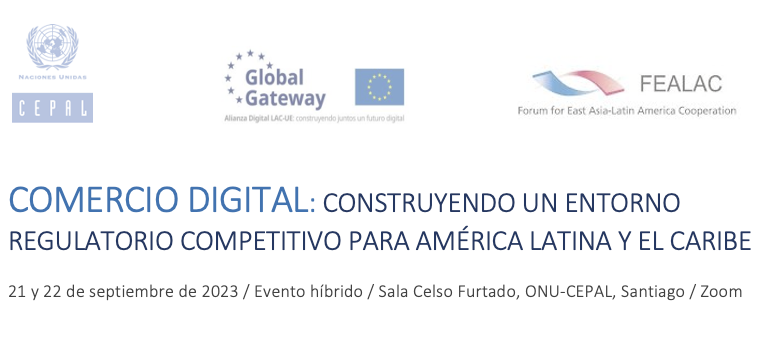Digital Trade: Building a Competitive Regulatory Environment for Latin America and the Caribbean
Work area(s)
Teaser
September 21 and 22, 2023 / Hybrid Event / Celso Furtado Room, UN-ECLAC, Santiago / Zoom
Event information

Date
21 - 22 Sep 2023, 06:00 - 10:00Event type
Participation
Background
Digital trade is a fundamental pillar of the ongoing transformation of the global economy. Embracing and leveraging digital trade is vital for countries to remain competitive and prosperous in the ever-evolving landscape of the 21st century. To take advantage of digital trade, Latin American and Caribbean (LAC) countries should increase their collaboration to create a robust digital ecosystem. The region can enhance its competitiveness on the global stage by streamlining regulations, promoting cross-border data flows, and investing in digital infrastructure. Additionally, facilitating the movement of skilled talent and encouraging innovation will further propel the digital economy in the region. Europe has already moved in this direction, promoting a regional digital agenda and a single digital market strategy. Europe and LAC have recently strengthened collaborative ties by establishing the EU-LAC Digital Alliance. This collaborative project creates a strategic framework to foster substantial bi-regional cooperation across the full spectrum of digital issues.
Latin America and the Caribbean has been promoting the eLAC2024 regional digital strategy for nearly two decades. This high-level policy forum serves as a platform to foster digital policies. As part of the commonly agreed actions under eLAC2024, countries have been promoting a regional digital market (RDM) through improving connectivity, promoting the digital economy, and fostering regulatory convergence.
As regulations are one critical driver for digital trade and integration, ECLAC is collaborating with the Organization for Economic Cooperation and Development (OECD) and the European University Institute (EUI) to understand better and map the rules in place in many countries across the region. With the OECD, almost twenty countries have been covered to estimate Digital Services Trade Restrictiveness Indices (DSTRI) and barriers affecting computer services to measure the ease of conducting digital cross-border transactions. With the EUI, almost thirty countries' digital trade regulations have also been analyzed. The Forum for East Asia and Latin America Cooperation (FEALAC) project supports both initiatives. Within this context, ECLAC also collaborates with the Economic Commissions for Africa (UN-ECA) and Asia Pacific (UN-ESCAP).
Goals
This conference aims to increase knowledge about digital trade regulations and policies and their importance for the economy in Latin America and the Caribbean. To this end, this meeting convenes government officials and experts from international organizations and academic institutions, such as ECLAC, OECD, and EUI, to share their vision and perspectives on this topic and tools for its measurement. Some additional goals for the conference are:
-
Show characteristics of the regulatory landscape for digital trade in most LAC countries, their evolution over time, and intercountry heterogeneity.
-
Compare digital trade restrictiveness levels between FEALAC countries in Asia and Latin America, together with countries in Africa.
-
Present preliminary research results on the impact of digital regulations on trade in IT-enabled services in LAC and other regions.
-
Train government officials in using the databases developed by ECLAC and its partners to analyze e-commerce statistics and regulations on digital trade.
Practical information
Simultaneous translation
Presentations and discussions will be in Spanish and English with simultaneous translation in both languages.
Registration
To participate in the conference:
-
In person: send an email to Javiera Arteaga, Economic Affairs Officer, International Trade Unit, ECLAC (javiera.arteagarivera@un.org). The meeting takes place in the Celso Furtado Room, ECLAC, Av. Dag Hammarskjold 3477, Vitacura, Santiago, Chile.
-
Virtually: register here. After registration, you will receive the link to the meeting.
-
Digital agenda for Latin America and the Caribbean (eLAC2024): link
Agenda is attached.
Related project(s)
Organizing institution
Economic Commission for Latin America and the Caribbean (ECLAC)
- https://www.cepal.org
- 56 222100000
Organisation for Economic Co-operation and Development (OECD)
- https://www.oecd.org/
- +33 1 45 24 82 00
Contact
Nanno Mulder
- nanno.mulder@cepal.org
- (56-2) 2210 2198
